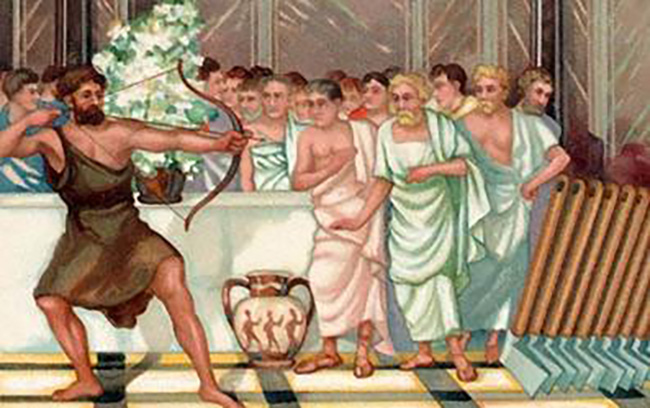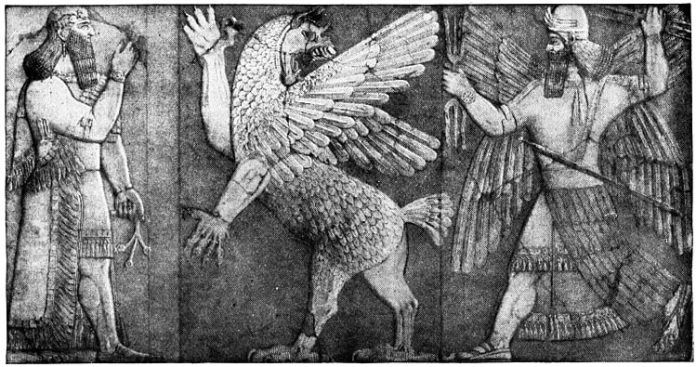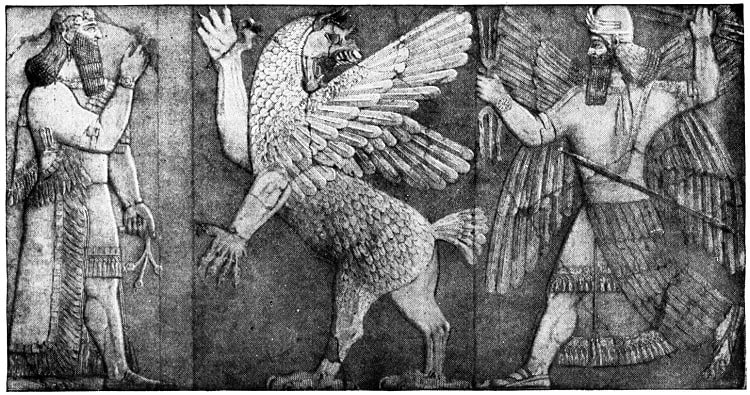Have you ever encountered a character in a story who seems minor at first glance, but upon closer inspection, reveals a surprising depth? In Homer’s epic poem, the Odyssey, such a character is Amphimedon. While his name might not be the first to come to mind when recalling the tale of Odysseus’s homecoming, Amphimedon’s presence and ultimate fate offer a fascinating glimpse into the societal norms and consequences faced by those who disrupted the natural order.
Imagine a grand palace, once a symbol of hospitality and order, now overrun by a band of self-proclaimed suitors. Among them stands Amphimedon, a figure whose story sheds light on the power dynamics and social hierarchy of ancient Greece. As Odysseus languishes presumed dead for years, these suitors, including Amphimedon, descend upon his palace, vying for the hand of Penelope, his faithful wife, and the potential claim to his throne. Their actions not only cause hardship for Penelope and Telemachus, Odysseus’s son, but also represent a direct challenge to the rightful king’s authority.
Amphimedon’s story takes a dramatic turn when Odysseus, disguised as a beggar, returns home. A thrilling showdown ensues, and Amphimedon, caught off guard and intoxicated by his sense of entitlement, meets his demise alongside his fellow suitors. But the story doesn’t end there. The Odyssey takes a fascinating turn as Odysseus ventures into the underworld, where he encounters the very man he vanquished – Amphimedon. This encounter offers a unique perspective on the aftermath of the conflict and the lingering regrets of those who defied Odysseus.
Intrigued by Amphimedon’s significance? This article delves deeper into his story, exploring his transformation from an Ithacan citizen to an arrogant suitor, the escalating tensions within Odysseus’s palace, and the ultimate consequences faced by those who defied the rightful king. We will also explore how Amphimedon’s fate serves as a cautionary tale within the broader narrative of the Odyssey, and how his story continues to resonate with readers today. So, if you’re curious to learn more about this seemingly minor character and the valuable lessons his story holds, keep reading!
From Ithacan Son to Arrogant Suitor: Amphimedon’s Origins and Role
In Homer’s epic poem, the Odyssey, a cast of colorful characters weaves a tale of loyalty, perseverance, and the perils of defying the rightful king. Among them stands Amphimedon, a figure whose brief yet impactful presence in the narrative sheds light on the societal norms and consequences faced by those who disrupted the natural order.
While the exact details surrounding Amphimedon’s life remain shrouded in the mists of ancient Greece, the poem establishes him as the son of Melaneus, an Ithacan citizen. Ithaca, a rugged island kingdom, served as the domain of Odysseus, the legendary hero whose long absence at sea forms the central conflict of the Odyssey.

Amphimedon’s story takes a turn during Odysseus’s extended twenty-year absence. With the king presumed dead, a band of self-proclaimed suitors descended upon Odysseus’s palace, vying for the hand of Penelope, his faithful wife, and the potential claim to his throne. Amphimedon emerges as one of these suitors, joining a group that reveled in the hospitality of Odysseus’s household while simultaneously disrespecting Penelope and her son, Telemachus.
The suitors’ behavior reeked of entitlement. They consumed Odysseus’s stores of food and wine with reckless abandon, treating the palace as their own. Amphimedon, along with his fellow suitors, disregarded the social order and the potential danger of aligning themselves against the rightful king, even in his presumed absence. Their actions not only caused hardship for Penelope and Telemachus but also served as a direct challenge to Zeus, the king of gods and upholder of cosmic order.
Amphimedon’s transformation from a seemingly ordinary Ithacan citizen to an arrogant suitor highlights the corrupting influence of self-interest and the disruption caused by the absence of a strong leader. His story sets the stage for the dramatic events to come, as Odysseus’s eventual return and the subsequent slaughter of the suitors restores order and justice to Ithaca.
Frequently Asked Questions (FAQs)
1. Who was Amphimedon in the Odyssey?
Amphimedon was an Ithacan citizen who emerged as one of the suitors vying for Penelope’s hand and Odysseus’s throne in his presumed absence. His story sheds light on the societal norms and consequences faced by those who disrupted the natural order.
2. What was Amphimedon’s role in the Odyssey?
Amphimedon’s role serves as a cautionary tale. He represents the disruption caused by the suitors’ presence in Odysseus’s palace and the consequences of defying the rightful king. His fate underscores the importance of loyalty and order within society.
3. Why is Amphimedon important in the Odyssey, even though he’s a minor character?
Despite being a minor character, Amphimedon’s story offers valuable insights. It highlights the complexities of human behavior, the dangers of succumbing to societal pressures, and the enduring importance of respecting authority and upholding social order.
4. How does Amphimedon’s fate compare to the other suitors in the Odyssey?
The poem doesn’t delve into the individual actions of each suitor. However, Amphimedon’s demise likely reflects the fate of all those who defied Odysseus. Some scholars argue that the suitors’ actions, while disrespectful, may have stemmed from societal pressures regarding the wait for a presumed-dead husband. Regardless of their motivations, Amphimedon’s fate serves as a stark reminder of the consequences for those who challenged Odysseus’s rightful rule.
5. Does Amphimedon’s encounter with Odysseus in the underworld add anything to the story?
Yes, Amphimedon’s ghostly whisper from the underworld offers a unique perspective. We learn about the suitors’ terror and confusion during Odysseus’s attack. This encounter adds a layer of humanity to the conflict, showcasing the human cost beyond Odysseus’s victory. It also highlights the enduring impact of the suitors’ actions and the restoration of order within Ithaca.
A Feast Turned Fatal: The Escalating Tensions in Odysseus’s Hall
Imagine a grand palace, once a symbol of hospitality and order, now overrun with a constant buzz of unwelcome guests. This is the scene that unfolds within Odysseus’s halls in the Odyssey, where the suitors, including Amphimedon, have transformed a place of welcome into a stage for their arrogance and entitlement.
The poem paints a vivid picture of the escalating tensions. The suitors, a growing band of presumptuous Ithacan nobles, view Odysseus’s presumed death as an open door to claim his throne and wife, Penelope. They treat the palace as their own, indulging in lavish feasts and entertainment funded by Odysseus’s dwindling resources. Amphimedon and his companions show a blatant disregard for Penelope’s authority, constantly underfoot and pressuring her to choose a new husband. Their disrespect extends to Telemachus, Odysseus’s son, who finds himself constantly challenged and undermined within his own home.
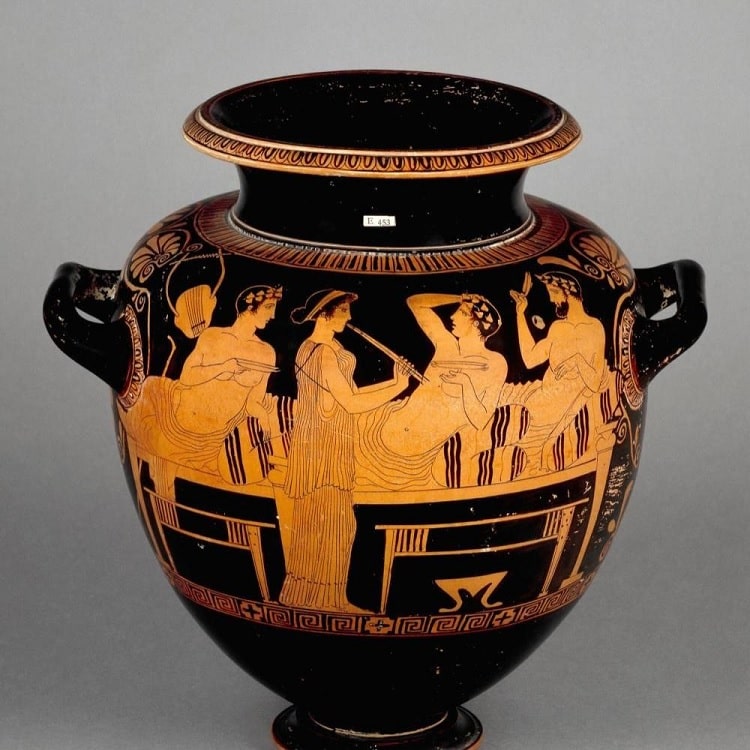
Penelope, a woman of remarkable strength and cunning, attempts to stall the suitors’ advances. She famously employs the weaving of a never-ending tapestry as a ploy, promising to choose a new husband only upon its completion. However, the suitors, led by the particularly arrogant Antinous, see through her ploy and continue their unwelcome presence.
Amphimedon likely participates in these disrespectful behaviors. The poem doesn’t delve into individual actions, but it paints a clear picture of the collective arrogance displayed by the suitors. Their actions not only cause emotional distress for Penelope and Telemachus but also represent a direct challenge to the established social order.
The tension reaches a boiling point when Telemachus asserts his authority, attempting to drive the suitors from the palace. This act of defiance further highlights the growing resentment and foreshadows the inevitable clash. As the suitors continue to overstep boundaries and disregard societal norms, the stage is set for a dramatic showdown – the return of Odysseus and the reclaiming of his rightful place. The disrespect and entitlement displayed by Amphimedon and his fellow suitors ultimately lead to their downfall, serving as a stark reminder of the consequences of defying the rightful king and disrupting the established social order.
The Suitors’ Demise: Witnessing the Wrath of Odysseus
The Odyssey reaches its dramatic climax with the long-awaited return of Odysseus, a homecoming that spells doom for the arrogant suitors who have plagued his palace. After years presumed dead, Odysseus, disguised as a beggar, infiltrates his own home, observing the chaos and disrespect that have taken root. Among the reveling crowd stands Amphimedon, oblivious to the impending storm.
The tension builds as Odysseus reveals his true identity to Telemachus and a handful of loyal allies. A meticulously planned assault unfolds, transforming the once-festive hall into a brutal battleground. Amphimedon and his fellow suitors, caught off guard and intoxicated by their sense of entitlement, find themselves woefully unprepared for the wrath of the rightful king.
Odysseus, fueled by righteous fury and aided by his son Telemachus, unleashes a devastating attack. Arrows fly, swords clash, and the once-proud suitors are cut down one by one. The poem describes the carnage in vivid detail, leaving no doubt about the finality of their actions. Amphimedon, likely caught in the fray, meets his demise alongside his companions, a grim reminder of the consequences of defying the rightful ruler.
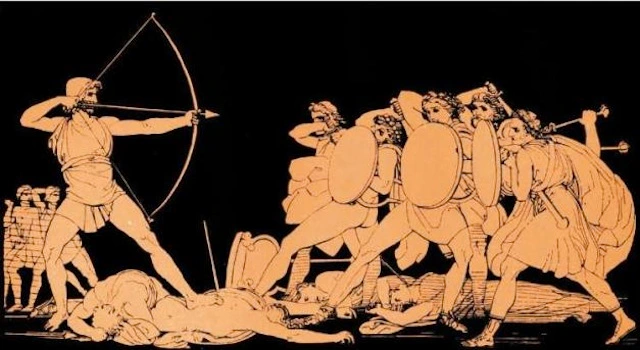
The slaughter is not without its complexities. While the suitors’ actions were undeniably disrespectful and disruptive, some scholars argue that their pursuit of Penelope was not entirely out of the blue. In ancient Greece, a period of waiting for a presumed-dead husband was customary, but it did have its limits. However, the suitors’ excessive behavior, their disregard for Penelope’s wishes, and their disrespect for Telemachus’s authority ultimately sealed their fate.
Amphimedon’s demise, along with the downfall of the other suitors, serves as a powerful symbol of the restoration of order. Odysseus’s victory not only reclaims his throne and family but also re-establishes the rightful hierarchy within Ithacan society. The once-disrupted palace is cleansed, and a sense of justice prevails.
A Glimpse from the Underworld: Amphimedon’s Regretful Whisper
The Odyssey takes a fascinating turn as Odysseus ventures into the underworld, the realm of the dead. Here, amidst the shades of countless heroes and mortals, he encounters the very man whose demise he orchestrated – Amphimedon. This encounter with the former suitor offers a unique glimpse into the aftermath and the lingering regrets of those who defied Odysseus.
The poem describes Amphimedon as a restless spirit, forever bound to the underworld. The encounter allows Odysseus to piece together the final moments of the suitors’ lives. Through Amphimedon’s spectral voice, we learn of the terror and confusion that gripped the suitors as Odysseus’s true identity was revealed. The once-confident band of men found themselves facing a skilled warrior fueled by righteous anger. Amphimedon, likely still bewildered by the swift turn of events, recounts the brutal battle and the overwhelming nature of Odysseus’s attack.
However, Amphimedon’s words hold more than just a description of the battle. There’s a hint of regret, a flicker of understanding that their actions had consequences. The poem doesn’t delve into the individual motivations of each suitor, but Amphimedon’s perspective sheds light on the potential complexities of their situation. Perhaps they were genuinely convinced of Odysseus’s death, or maybe societal pressures led them down a path of entitlement.
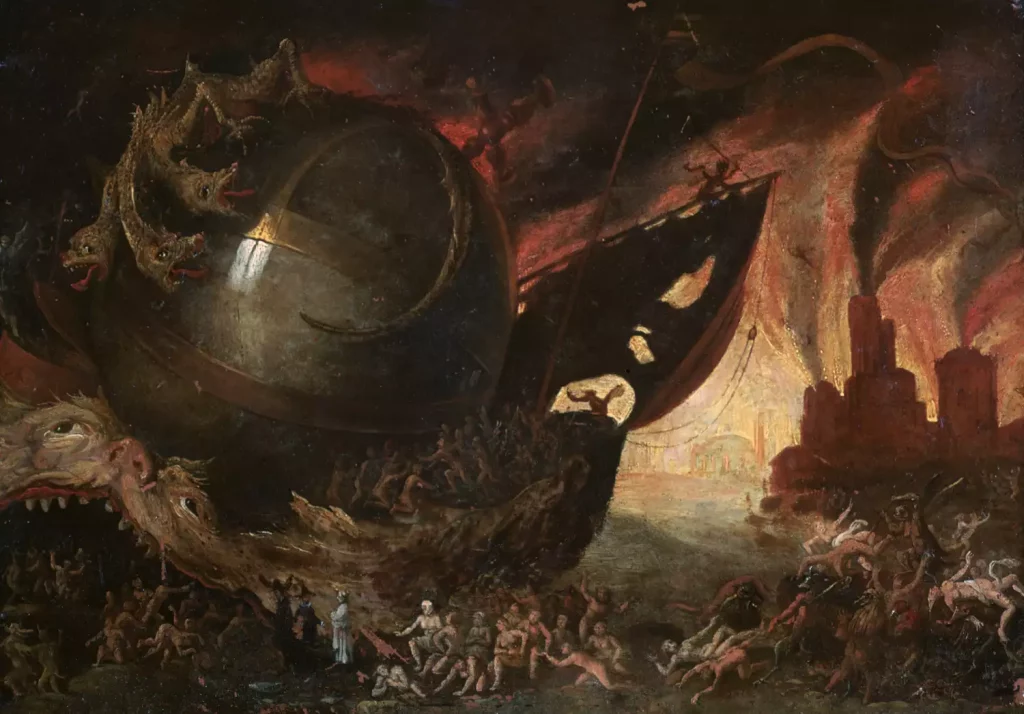
This encounter in the underworld adds another layer to the story. It allows the reader to see the fallout not just from the perspective of the victor but also from the vanquished. While Amphimedon’s actions were undeniably disruptive, his spectral whisper offers a glimpse into the human cost of the conflict.
Amphimedon’s fate serves as a chilling reminder of the finality of death and the consequences of defying the rightful ruler. His encounter with Odysseus in the underworld underscores the enduring impact of the suitors’ actions and the restoration of order within Ithacan society.
Beyond the Battlefield: The Symbolic Significance of Amphimedon’s Story
While Amphimedon may seem like a minor character in the grand narrative of the Odyssey, his story holds profound symbolic significance. It serves as a cautionary tale, a stark reminder of the consequences faced by those who disrupt the established social order and defy rightful authority.
In ancient Greece, societal structures were deeply ingrained, with a clear hierarchy and expectations for behavior. A king held not just political power but also a symbolic role, representing order and stability. The actions of the suitors, including Amphimedon, directly challenged this established order. Their presence in Odysseus’s palace, their disregard for Penelope’s wishes, and their disrespect for Telemachus’s authority all contributed to a sense of chaos and disruption.
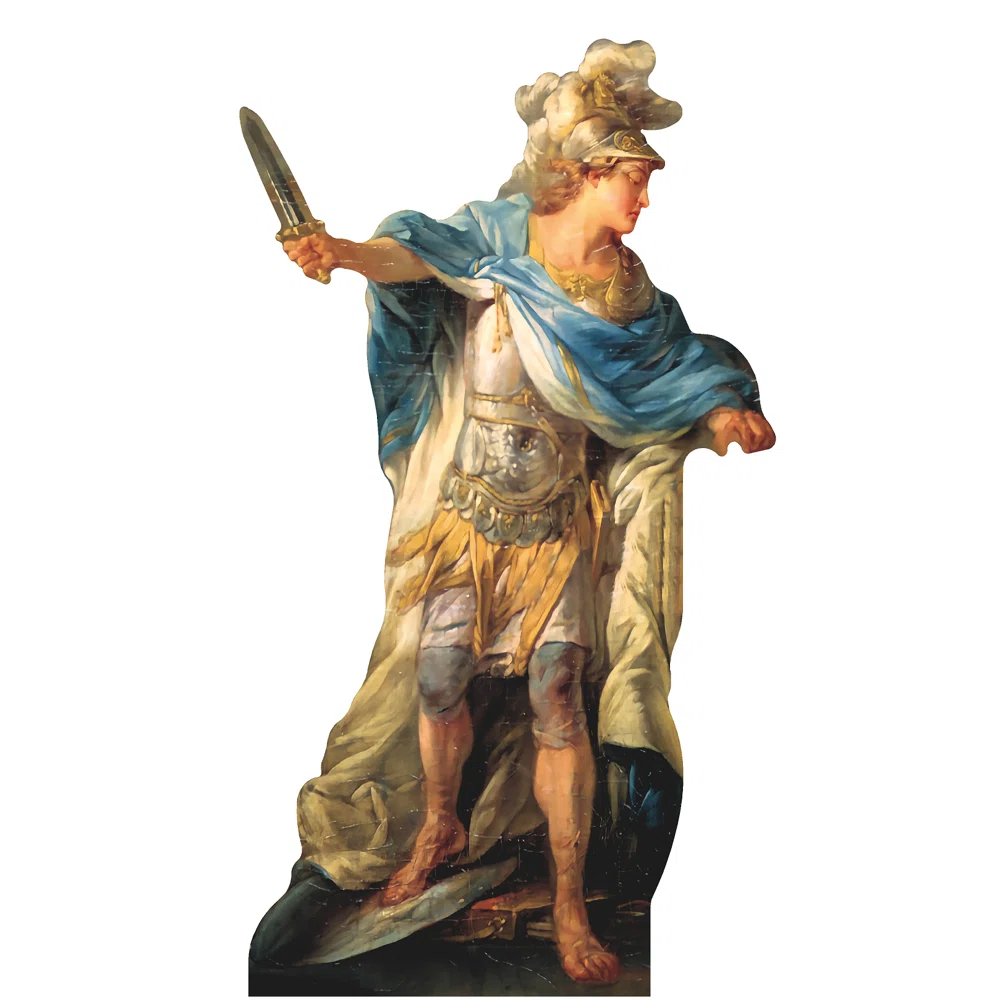
Amphimedon’s fate serves as a powerful symbol of the consequences of such actions. His demise, along with that of the other suitors, signifies the restoration of order and the reaffirmation of Odysseus’s rightful place as king. It’s a reminder that defying authority, especially when fueled by self-interest, can lead to a swift and brutal downfall.
The story also touches on the importance of loyalty and perseverance. Throughout his long journey home, Odysseus remains steadfast in his love for Penelope and his determination to reclaim his throne. Amphimedon and the other suitors, on the other hand, display a lack of loyalty and patience. Their actions highlight the contrast between those who remain true to their obligations and those who succumb to temptation and self-serving desires.
Amphimedon’s story resonates even today. It serves as a reminder of the importance of respecting established authority figures and upholding social order. While the societal structures of ancient Greece may seem distant, the core themes of loyalty, order, and the consequences of defying authority remain relevant across cultures and throughout history. By examining Amphimedon’s fate, we gain a deeper understanding of the values that the Odyssey upholds and the enduring power of its narrative.
A Minor Player, a Major Lesson: The Legacy of Amphimedon in the Odyssey
Within the epic sweep of the Odyssey, Amphimedon might seem like a mere footnote, a fleeting player in the grand drama. However, a closer look reveals that his story carries significant weight, serving as a powerful cautionary tale for both the characters within the narrative and the audience itself.
Amphimedon’s fate acts as a stark reminder of the consequences of defying authority. In the hierarchical world of ancient Greece, a king held not just political power but also a symbolic role, embodying order and stability. The suitors, including Amphimedon, directly challenged this established order with their presence in Odysseus’s palace. Their disregard for Penelope’s wishes and disrespect for Telemachus’s authority embodied chaos and disruption.

Amphimedon’s demise, swift and brutal, serves as a warning to other characters, particularly Telemachus, who grapples with asserting his authority in the face of the suitors’ arrogance. Witnessing the downfall of Amphimedon and his companions serves as a powerful lesson, urging Telemachus to remain steadfast in his loyalty to his father and uphold the rightful order.
Beyond the immediate characters, Amphimedon’s story resonates with the audience as well. It transcends the specificities of ancient Greek society and speaks to universal themes of loyalty, temptation, and the consequences of our actions. We are all faced with choices in life, and Amphimedon’s fate reminds us that succumbing to self-interest and disregarding established structures can have severe repercussions.
The story also compels us to consider the complexities of human behavior. While the suitors’ actions were undeniably disruptive, some scholars argue that their pursuit of Penelope wasn’t entirely out of line. Ancient Greek customs dictated a waiting period for a presumed-dead husband, but societal pressures may have influenced their actions. Amphimedon and the other suitors become a cautionary tale against the dangers of societal pressures and the importance of navigating them with integrity.
Amphimedon’s legacy in the Odyssey lies not in his individual actions but in the broader message his story conveys. He serves as a powerful symbol, reminding us of the importance of respecting authority, upholding order, and remaining true to our values. By examining his fate, we gain a deeper understanding of the social norms and moral compass that guided the world of the Odyssey, and the enduring power of these themes to resonate with readers even today.
Beyond the Page: Exploring Suitors and Amphimedon’s Enduring Legacy
The portrayal of suitors in Greek mythology extends far beyond Amphimedon and the halls of Odysseus. Suitors, or potential husbands vying for the hand of a woman, are a recurring theme across various myths. In some cases, like the story of Helen of Troy, their pursuit can spark devastating conflicts. In others, like the tale of Penelope and the suitors, their actions highlight the importance of loyalty and upholding social order.
Amphimedon’s story adds a specific layer to our understanding of this common trope. He represents the dangers of succumbing to societal pressures and acting out of self-interest. Unlike some suitors in other myths who might be portrayed as heroic figures, Amphimedon and his companions serve as cautionary examples.
The portrayal of Amphimedon has also been interpreted in various artistic adaptations of the Odyssey. In some film versions, the suitors are depicted as overtly villainous, emphasizing the clear distinction between them and Odysseus. Other adaptations offer a more nuanced portrayal, showcasing the complexities of their motivations.
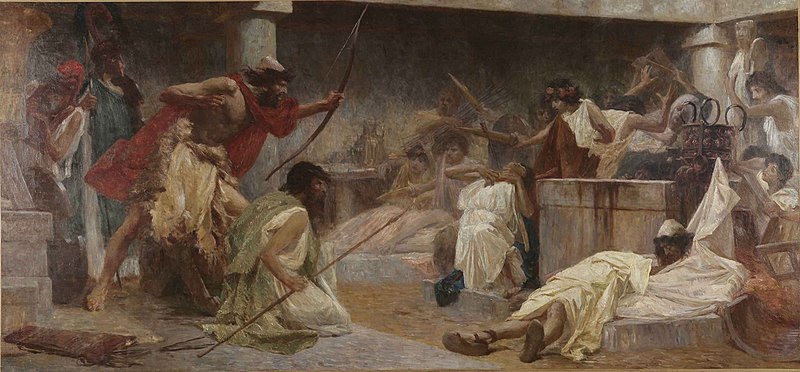
Amphimedon’s legacy extends beyond the specific details of his story. He serves as a reminder of universal themes that continue to resonate with audiences today. His fate underscores the importance of loyalty, the consequences of defying authority, and the dangers of succumbing to temptation.
Amphimedon may be a minor character, but his story offers a valuable window into the social norms and values of the ancient Greek world. By examining his fate within the broader narrative of the Odyssey, we gain a deeper appreciation for the enduring power of this epic poem and its timeless themes.
This concludes our exploration of Amphimedon. We hope this journey through the Odyssey has shed light on his role and the significance of his story. Feel free to delve deeper into the epic poem or explore other myths featuring suitors! There’s a whole world of fascinating characters and themes waiting to be discovered.


